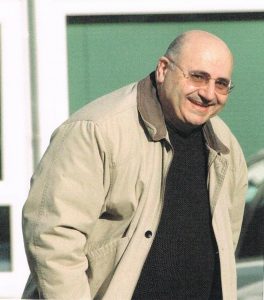
We are very sorry to report that Dr Riad Kocache, a founding trustee of The Idries Shah Foundation, has died. A polymath in the truest sense of the word, Riad touched the lives of a great many people, and will be enormously missed. Riad was a friend of and adviser to Idries Shah, and taught his three children Arabic when they were young.
They have each written a personal tribute, which follows below.
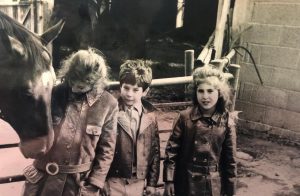 I remember very clearly the first time I saw Riad, who was to become my beloved teacher and friend.
I remember very clearly the first time I saw Riad, who was to become my beloved teacher and friend.
I must have been six or seven. We three children had been traumatised by a cruel Iranian teacher who had resorted to humiliation and physical punishment in order to drum the Quran into us.
Now we were summoned to meet our new teacher: I walked into his house with great trepidation.
Sitting quietly was a gentle figure with twinkling eyes and a kind smile on his round face. He could not have been more different than our old teacher – but, after all we had been through, could we really trust him?
Riad suggested that, before he began to teach us, we should all have tea.
He produced a large and beautiful cake and – as we watched him with big round eyes – proceeded to cut it into four precisely equal pieces. He and the three of us each devoured a quarter of it on the spot.
After that we knew that he wasn’t like other adults: he was one of us. He became our confidant and friend.
His lessons were the complete opposite of those of our despotic former teacher, who had relied on rote learning.
Instead of trying to teach us the Quran by heart, Riad concentrated on its spirit.
I remember him teaching that the English language word ‘prayer’ comes from a root associated with asking, begging for something. The Arabic, on the other hand, comes from the concept of communication and connection. This explanation was like a shaft of light for me.
We learned Arabic through the wildly exciting stories of the pre-Islamic hero and poet ‘Antar, and of ’Abla’, his great love. Riad, in turn, instilled in me a love for the Arabic language and culture which has lasted a lifetime: it is because of him that I chose to study Arabic at University.
He was an inspired teacher: patient, kind and seemingly adept at everything. Over the years he taught each member of my family something we had a mental block about.
He seemed to be able to get to the essence of any subject and to transmit it.
It was only many years later that I discovered a hint as to how he had developed such extraordinary patience and capacity.
When I was seventeen, I spent a couple of weeks in Damascus with my father. We met one of Riad’s relatives who said: ‘We didn’t think he would amount to anything – when he was a child, he couldn’t learn anything by heart.’
I remembered our own tyrannical Quran teacher and I realised that Riad too had been subjected to the kind of rote learning and humiliation he had been at such pains to rehabilitate us from as small children.
My father bridled: I saw real anger flash in his eyes. He replied: ‘Well you were all wrong – Riad Kocache is highly educated. He is a great man.’
My father counted Riad as one of his closest and most beloved friends. When he died, it was naturally Riad whom we called on first. To the great comfort of our family, Riad came and read the prayers at his funeral.
Afterwards, with his characteristic unassuming gentleness, he took on the role of ‘second father’ to us three young adults. We felt his guiding presence in our lives as we had felt that of our own father.
We always felt that he was on our side, and that he would never guide us wrong.
The last time I saw him, he said his cardiac illness had entered a new phase. It was strikingly similar to what my own father told me towards the end of his life by the same illness.
Riad and I sat in his beloved workshop and discussed woodwork. I have recently taken up the hobby and Riad, as he was with everything, was an absolute adept. Even at the end of his life, he was so generous with his time. I like to hope that he spent a happy afternoon sharing his immense knowledge of carpentry with this beginner.
Saira Shah
Tahir remembers Riad as our teacher, as a storyteller and as an unfaltering supporter. Saira remembers him as our confidant and lifelong friend.
‘Calm’, ‘generous’, ‘wise, with a mischievous sense of humour’ are descriptions that others I have asked have come up with, to help me sum up a man who has been part of my life, ever since I can remember.
All of these descriptions ring true.
As a polymath, Riad would approach any new challenge as the chance to gather reliable information.
Question him on something he knew little about, and rather than attempting to fob one off, he would say something along the lines of: ‘Leave it with me.’ Or, ‘I’ll look into it and get back to you.’ And rather than at that point forgetting all about it, which is what most people who say such things tend to do, he really would look into it.
He would conduct in-depth research into whatever it was, using his scientific brain, twinned with his natural intelligence, to problem-solve, scrutinise, and learn. And he was generous enough, and well balanced enough, to pass on what he had learnt.
I think of Riad, and I think of kindness and integrity.
That is how he was in a position to advise on everything from how to cut the perfect slice of bread, to parallel parking, to fractions, to making exquisite violins.
It made no difference whether the recipient was a child or an adult, Riad could identify with someone in need and explain things so that they made sense.
Although he knew us three from tiny children, he never once patronised us when we were adults. He never placed emphasis on his superior wisdom, or on his years of experience.
Riad preferred to let others shine, rather than attempting to take centre-stage himself.
Perhaps the one area in which he did allow himself to feel burning pride was his family: his daughters Arwa and Jumana, and his wife Andrea.
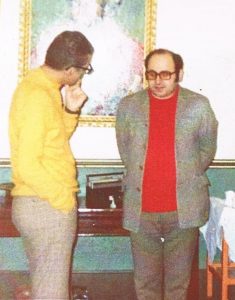 If I ever saw Riad’s chest swell, it was when he was talking about them.
If I ever saw Riad’s chest swell, it was when he was talking about them.
I know that the future meant a great deal to him. When I was a child I remember him saying that none of the men in his family had lived to be much older than fifty.
Perhaps his beloved woodlands helped him visualise a continuation after his death. Certainly the legacy that he has passed to his daughters, and to my brother, sister and me will reach far into the future.
Riad was insightful, immeasurably kind, extraordinarily hospitable, and positive – whilst remaining practical.
He was the perfect balance between a scientist and a creative force.
He was our true friend.
And we will miss him terribly.
Safia Shah
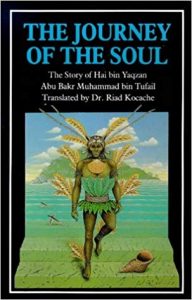 An Uzbek carpet-maker in northern Afghanistan once invited me to inspect the loom at which he was weaving. I commented at the awe-inspiring patterns and the vibrant colours conjured from the lateral threads.
An Uzbek carpet-maker in northern Afghanistan once invited me to inspect the loom at which he was weaving. I commented at the awe-inspiring patterns and the vibrant colours conjured from the lateral threads.
‘Brother,’ the craftsman replied solemnly, ‘the weft may be striking to the eye, but it is only made possible by the strength of the warp – even though in a good carpet the threads are almost invisible to the eye.’
I have often turned the comment over in my mind as I have considered books and writing. In the same way that in weaving the vertical threads are the thing of real importance, the essence of a story is what matters in writing, rather than the twists and turns of the plot.
Last spring I began work on a book called Travels With Nasrudin. It was a way of considering a lifetime of adventures through the lens of the wise fool of Oriental folklore – Mulla Nasrudin.
Before writing a word of manuscript, I filled a thick journal with notes of all the wisdom that has ever slipped in through my senses. Page after page, I scribbled – not events and episodes that would form the meat of the book, but aspects of a different nature…
The essence of the wisdom that has shaped my life.
I often ponder how we frame our lives by recounting milestones and plot-points. And how, by doing so, we tend to neglect the spirit which, for me at least, is the thing of real value.
Once the entire journal was filled, I flicked through it as I prepared to write the first sentence of Travels With Nasrudin. Page after page was referenced with the letters ‘RK’ – the initials of the most extraordinary and exceptional man I have ever known –Riad Kocache.
I placed a photo of him on my desk, because he was the essence of the story I was writing. Between paragraphs and pages I would glance over at it, breathing in the wisdom of my inimitable friend. Like the warp threads on a weaver’s loom, Riad is present in every episode of the book, but remains largely unseen.
As my sisters have said, Riad taught us Arabic when we were children. For years he would come to Langton House each Friday evening, and teach us the rudiments of reading and writing. The fact that Arabic script is seeded deep inside me is testament to his mastery as a teacher, rather than my inadequate skill as a student.
Although important, the language lessons weren’t what I looked forward to.
It was the stories I loved.
At the end of every lesson, Riad would finish with an instalment of a tale drawn from one of the great treasuries of Arab folklore. As we clustered around with bated breath, he recounted exploits from the epics of Antar and ’Abla, Sayf ibn Dhi Yazan, and so many others.
To the three of us, Riad was our own personal storyteller – exactly like those found in the caravanserais of Arabia. But we didn’t have to travel to some distant encampment to listen, because each week he came to us, regular as clockwork.
From time to time our teacher would invite us to drive through the countryside with him on some mysterious quest. The mini-adventures would always pass on some lesson, even though we didn’t realise it at the time.
On one occasion in about 1976, when Safia and I were ten, and Saira was twelve, Riad took us to Brighton for the day. While touring the pier, he spotted a twenty-pound note on the slatted walkway – in grave danger of falling through into the sea.
Riad remarked at what a large amount of money it was as he picked it up.
Gasping in amazement, we covered our mouths with our hands.
‘What shall we do with it?’ we asked in unison.
‘There is only one thing to do,’ Riad responded knowingly.
‘Buy lots and lots of ice cream?’ I suggested.
Our teacher shook his head. Then, pacing forward to the nearest stall-keeper, he handed it in.
‘Would you see that the owner of this money is found, please?’ he asked.
I can still see the haggard stall-keeper’s ear-to-ear grin and double thumbs up.
As time passed, we came to understand there was far more to the quiet man who was teaching us Arabic, telling us stories, and taking us on day trips, than met the eye.
Riad Kocache was an inventor, a musician, a translator, a horseman and, most importantly, one of the leading scientists of his generation.
His professional area of expertise lay in the accurate measurement of gases – something that, as children, went way over our heads.
One Friday evening when we were small, he brought an electronic machine to show us. He’d designed and built it from scratch.
Crowding around, we asked a hundred questions.
With characteristic patience, Riad answered each one. Then he announced that, as part of its rigorous testing, the machine was to be dropped from a great height the following week.
Next Friday we rushed to the door as soon as our teacher arrived for the lesson. Eagerly, we asked how the machine had fared. His face taut, Riad responded calmly with three words. They’re burnt into my memory:
‘Smashed to smithereens.’
Undeterred, Riad went back to the drawing board and redesigned the unit – proof if anyone needed it of his dedication and patience. His expertise eventually formed part of a doctoral thesis. Each week, when we would ask how the writing was going, Riad would hold out a hand, palm upwards, and move it up and down.
‘The professor weighs it like this,’ he would say, ‘then tells me to go away and write some more.’
Considering ‘Solid Electrolyte Oxygen Sensors’, the dissertation was awarded by Birmingham’s Aston University in 1980. I later discovered that the professor overseeing Riad’s PhD was Dr James Lovelock – the celebrated Futurist who originated the Gaia Hypothesis.
Looking back at the life of Riad Kocache, it would be fair to say that few knew him inside and out, except for Andrea, his Swiss-born wife, and Arwa and Jumana, his wonderful daughters.
A true polymath, Riad lived many lives in one.
Born on 16th July 1942 in Damascus, he once told me how he came to have the name that he did. As I remember it, the family gardener, a trusted and much-loved member of the household, was dispatched to register the new baby’s birth. A name had been entrusted to him, with the correct spelling carefully written out.
But when he got to the registration office the gardener was overcome with his love of nature. So, instead of registering the baby’s identity as instructed, he presented the name of the most beautiful thing he knew, ‘Riad’ – the Arabic word for ‘gardens’.
In some ways Riad was like a gemstone shrouded by a veil.
If you were lucky, the cloth was lifted just enough for you to experience a dazzling glint of light. But almost no one ever saw more of the light than they needed to see. Whereas a great many people rush to show off their achievements, Riad never did. My sense has always been that he valued modesty and discretion above all else. These two qualities defined him.
As the years progressed, my father came to understand that Riad Kocache was unlike anyone he knew. Supremely patient, he was honourable, thoughtful, and good-natured. At the same time, he could advise on almost anything, passing on an abundance of skills.
As a child I was profoundly dyslexic, so much so that everyone thought I was an imbecile.
Everyone except for Riad.
While others lampooned me, he tutored me in mathematics, and explained how to harness the power of imagination.
When my father decided to learn to drive – at the seasoned age of fifty-five – it was Riad who taught him. He was later brought in to wean my father from his typewriter to a word processor; and he assisted in various high-profile projects as well.
In the early ’eighties, when my father wanted to republish Ibn Tufail’s story of Hai bin Yaqzan – said by scholars to be the inspiration behind Robinson Crusoe – it was Riad Kocache whom he asked to make the translation. Published under the title The Journey of the Soul, it marked Riad out as an exceptional translator and wordsmith in his own right. This was no surprise to my sisters and me of course, for we had had him as our private storyteller upstairs in the playroom for a decade.
On my father’s death in November 1996, it was Riad Kocache – his most trusted friend – who recited prayers at the grave-side. And, years later, when plans were put in place to establish The Idries Shah Foundation, he stepped in as one of the founding trustees.
In a world of uproar and folly, Riad has been the one constant bedrock in all our lives. Sometimes so consumed was I with life, I neglected to reach out for months at a time. But when I did, he was always there. To say he was dependable would be the understatement of the century.
As the years passed, the veil was occasionally lifted on the gemstone – revealing new facets of a man who never ceased to amaze us all.
On one visit to his house in Crowborough, East Sussex, more than twenty years ago, Riad complained of arthritis in his hands. I asked what treatment he was getting.
‘The doctor said it’s better to work the joints than to use medical creams,’ he explained.
‘So what therapy are you taking?’
Riad cocked his head at a cabinet on the wall.
‘Have a look.’
Pulling back the cupboard doors, I found it filled with violins.
‘The first one was the hardest,’ he told me, ‘but once it was finished, I got the knack of making them.’
If there’s a dominating thing Riad Kocache taught me, it was to have faith in myself, and to take my time to work things out.
Whether the problem was learning how to do sums for a school exam, building a machine to measure gases, or making a violin, Riad’s formula for an answer was to observe the situation from different angles, and never to doubt that success would be ultimately achieved.
During the summer, when Travels With Nasrudin was ready, I sent the very first copy to Riad, having dedicated the book to him. He wrote back, touched.
His essence is woven through the pages, just as it is through my life.
Like the warp threads in the carpet on the loom in northern Afghanistan, Riad Kocache may have been almost invisible to the uninitiated, but he was there all the same.
And, because he was there, and because he is there, the effect of everything he gave will continue to be passed on by all those whose lives he touched.
Tahir Shah
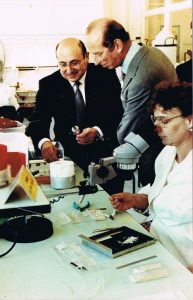 Dr Riad Mouhamed Adel Kocache
Dr Riad Mouhamed Adel Kocache
Born 16th July 1942, Damascus, Syria
Died 3rd November 2019, Hastings, England.